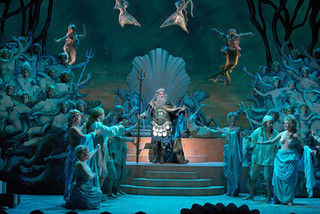|
Back
The Enchanted Island returns to the Met New York
The Metropolitan Opera House
02/26/2014 - & March 1, 5, 8, 12, 15, 20, 2014
Jeremy Sams (compiler): The Enchanted Island
David Daniels (Prospero), Danielle de Niese (Ariel), Susan Graham (Sycorax), Luca Pisaroni (Caliban), Andriana Chuchman (Miranda), Janai Brugger (Helena), Elizabeth DeShong (Hermia), Andrew Stenson (Demetrius), Nicholas Palleson (Lysander), Placido Domingo (Neptune), Anthony Roth Costanzo (Ferdinand)
The Metropolitan Opera Chorus, Donald Palumbo (chorus master), The Metropolitan Opera Orchestra, Patrick Summers (conductor)
Phelim McDermott (director), Julian Crouch (associate director and set designer), Kevin Pollard (costume designer), Brian MacDevitt (lighting designer), Graciela Daniele (choreographer), 59 Productions (animation and projection design)

P. Domingo (© Ken Howard/Metropolitan Opera)
The Enchanted Island was a bold new concept for the Met when this unusual work premiered on New Year's Eve 2011. This is not a conventional opera as we know it, but rather a pastiche of music by baroque composers, including the well known George Fridric Handel, Antonio Vivaldi, and Henry Purcell and such lesser ones as Jean-Marie Leclair, Jean-Féry Rebel, and Giovanni Battista Ferrandini. The British director Jeremy Sams compiled their music to suit his own libretto, which he adapted loosely from Shakespeare's The Tempest and A Midsummer Night's Dream.
As a work of music drama, it is hard to call it a success. Sams's libretto is dramatically thin, with few compelling plot points and rather static action that roughly recounts highlights of The Tempest. In short, it is more fluff than the stuff of grand opera. The musical selections are entertaining and reasonably well paced to what plot there is. Phelim McDermott's production adds pizzazz, with colorful sets that appear intended to recall conventions of seventeenth and early eighteenth-century theater. Very often the effect is quaint to the point of appearing cheesy - Ariel's fairy dust is illuminated with effects that all too readily recall Disney or Dreamworks animation effects. But occasionally it is compelling - Neptune's court in the ocean depths benefits from projections of marine wildlife and stagecraft that allow mermaids to swim around.
It is in the music that the evening found real strength. In the program notes, Sams congratulates himself on making "old" music sound so "modern," but it is in fact its antiquity that lends appeal. The Met assembled a truly stellar cast to perform the requisite vocal pyrotechnics, even if it did little to create a compelling drama. The role of Neptune supplied an attractive cameo to veteran "baritenor" Placido Domingo (the portmanteau acknowledges his prodigious recent work in the baritone repertoire of his original training). Just past his 73rd birthday, the signature voice continues to draw cheers even when it is challenged by the higher notes and sustained legato which now tend to elude it.
Susan Graham's Sycorax displayed the talented mezzo's superb musicianship, though the part's light touch could add to speculation that she will eschew the heavier roles she has performed so well (another of her major solo parts this season is Anna in a Paris production of The King and I). And in our Renaissance of countertenor singing, aficionados of that vocal type will find much to please them. David Daniels's Prospero recalled his greatest Handelian singing, by turns affecting and virile. His younger colleague Anthony Roth Costanzo, who just wrapped up a highly successful run as Prince Orlofsky in the Met's new production of Johann Strauss's Die Fledermaus, was a stunning presence in the role of the favored suitor Ferdinand. As the thwarted Caliban, the superb baritone Luca Pisaroni reminded us of how compelling baroque baritone parts can be. Danielle de Niese's Ariel stole the show with fine coloratura sweeps. Andriana Chuchman and Elizabeth DeShong also made fine contributions in the respective parts of Miranda and Hermia.
The Met invested a great deal in this production, which supports general manager Peter Gelb's ambition to make the house and its repertoire more accessible. With revenues and attendance down recently, this is an ever more pressing concern. But this pastiche approach seems more likely to draw vocal connoisseurs - the Met's core constituency - than incidental publics who might feel more engaged by an English text.
Paul du Quenoy
|